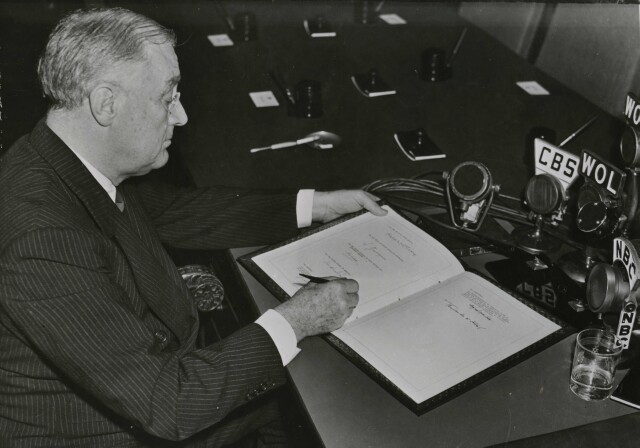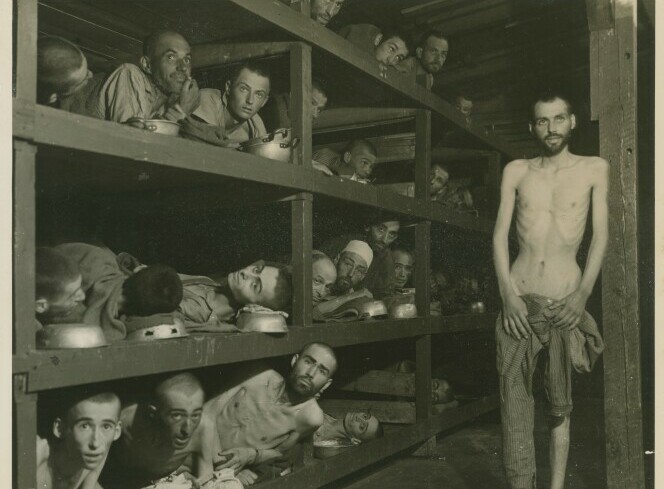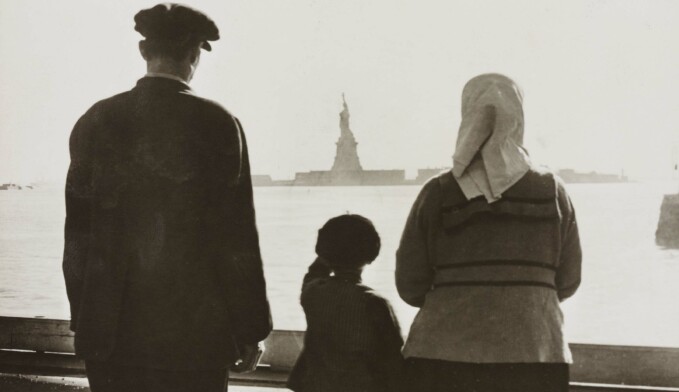Ken Burns' Latest for PBS Reveals Chilling History of "The U.S. and the Holocaust"

The women sat around the worn kitchen table talking in Yiddish about the neighborhood, their jobs and their families. One woman, though, spoke only about the family she once had. The Nazis killed them. Now Dora sat in a sixth-floor apartment in the Bronx, kibbitzing with friends, the numbers on her left arm showing when she reached for the babka. And so, before kindergarten, sitting with my grandmother's neighbors, I began to learn about the Holocaust.
And I have continued to learn from survivors, books, documentaries, lectures and lessons. Twenty years after World War II ended, some American Jews still talked about President Franklin Roosevelt around the dinner table. It was complicated -- how he helped, but not enough -- Jews during World War II. And so, admittedly, I approached Ken Burns' The U.S. and the Holocaust presuming I knew the subject well. I was wrong.
Invite job candidates to apply live during the Media and Advertising Community’s Black Talent Outreach Week at MediaVillage.com and AdvancingDiversity.org October 17-20. Apply for jobs/submit your resume here.
Burns' magic is that he takes American history, stories we think we know, then artfully explains what we don't. As always, the work is magnificently detailed, borne of pure history, and presented accurately and sensitively. In this, Burns and co-directors Lynn Novick and Sarah Botstein present a deep dive into a turning point of history over three nights, beginning September 18 on PBS.
"I'll never work on a more important film," Burns said. "For me as a human being, I can remember my dad, at way too young an age, sort of making me watch Judgment at Nuremberg, where you know, the climax is when they turn off the lights in the courtroom and play not the feature film footage, but the documentary footage of what they found, the concentration camps. And it was a profoundly moving experience for me. I'm not Jewish, but I think it's a huge humanitarian crisis for the world. It isn't just a Jewish story."

The series explains that in 1932, FDR was the first major candidate to denounce antisemitism, and he appointed more Jews to his administration than any previous president had. FDR read Mein Kampf in the original and despised Hitler. As the filmmakers note, Roosevelt (pictured at top) was president, not king; he couldn't simply change immigration quotas.
Burns was determined to show the carnage of the Holocaust without strictly focusing on the mountains of bones of the dead, or the skeletal prisoners as they were released, certain the world had forsaken them. These images had to be shown, or this evil could not be grasped.
This documentary reveals what most don't realize: Yes, people in America and elsewhere knew. They knew Jews were being rounded up. Articles had been published in American newspapers in the 1930s -- and there were meetings of brown shirts around the United States
"We have footage from a New Jersey German American Bund rally that we needed to put a location stamp on," Burns said. "That is a little thing that tells you this is in New Jersey. Because looking at this color footage of thousands of people picnicking with Nazi flags, you would presume this was Germany. And by reminding us -- this was the late, mid 1930s -- this is us, right? This has always been around. And these views, you know, found that particular evil, found great expression in the Nazi regime, and it has a significantly long half-life."
With Peter Coyote narrating, actors including Liam Neeson, Meryl Streep, Paul Giamatti and Matthew Rhys give voice to historical figures. The voices that will linger with viewers, though, are two elderly survivors.
Eva Schloss, who had been childhood friends with Anne Frank, had been sent to Auschwitz. She and her mother survived; her brother and father did not. Schloss' mother and Frank's father eventually married and started over, and Schloss, at 93, continues to speak out.
As does Guy Stern, 100. He was 15 when his parents managed to send him to relatives in St. Louis. At the war's end, as a GI, Stern made his way to his hometown of Hildesheim, Germany. The town was reduced to rubble; his family gone.
"We have seen the nadir of human behavior and we have no guarantee that it won't recur," Stern says on camera. "If we can make that clear and graphic and understandable not as something to imitate but as a warning of what can happen to human beings, then perhaps we have one shield against its recurrence."
The six-hour documentary puts into context how Jews in Europe were going about their lives when Hitler became chancellor in 1933. By war's end, a little more than two out of every three European Jews had been killed. It's not lost on the filmmakers that the hatred, which fueled the Holocaust, was on display on January 6.
"It's been very eerie to see the echoes of the past echoing louder and louder and louder throughout the time that we made the film," Novick said at a recent Television Critics Association press conference. "Every film we make reverberates in the moment that we're in. But this one, particularly so, has been operating on many levels, in terms of the fragility of our democracy, as Daniel says in the film, and the resurgence of antisemitism and white supremacy and racism and hate speech that have been sort of on the fringe, moving toward the mainstream. While we were making the film, it has made our relationship to the material, and the story we're telling, and the kinds of questions we're asking, just get sort of louder and more powerful for all of us."
She referred to Daniel Mendelsohn, a Bard College professor of humanities, editor and writer whose family always talked about how much he looked like an uncle killed in the Holocaust. Photos are shown, and the resemblance is mighty.
"I think people who watch this film will be able to connect the dots in a very powerful way," Mendelsohn said at that TCA session. "And without belaboring the point, I think it's pretty clear. I think that people will see in this film that these kinds of things happen, and they keep happening. They are happening."
Co-director and producer Botstein, like Mendelsohn, lost family to the Nazis. She recalled how they were "constantly calibrating in the editing room and when we're making our films to tell the history, to tell the story, to make it emotional, to make it interesting, to make it personal. I think you can hold sadness and anger at the same time.
"You can hold sadness and outrage," Botstein continued. "And I think this is obviously a very dark and tragic story, both for what happened to the Jews in Europe and how the Americans responded, and we're constantly calibrating those tensions. Every film I've worked on with Ken is no different. We want to think about the things that make us a great and unique and very special country, and the things that make us a country that needs attention."

As the United States continues to struggle with how to treat refugees, antisemitism has skyrocketed. The Anti-Defamation League, which tracks antisemitism, reported a 34 percent increase in 2021 from the year before.
"As filmmakers working just in American history and that provincial slot, we constantly come over the echoes and the rhymes of history again and again and again," Burns said. "It becomes our obligation when faced with information to see whether you can escape the specific gravity of that which continually pulls not only the human race -- it's easy to blame it just on people -- and it pulls us all individually, psychologically, spiritually, emotionally, intellectually back all the time. And so I think this is the part of art."
The U.S. and the Holocaust will premiere Sunday, September 18 at 8 p.m.Episodes two and three can be seen on Tuesday, September 20, and Wednesday, September, 21. Check local listings.
Photos courtesy of PBS.
Click the social buttons to share this content with your friends and colleagues.
The opinions and points of view expressed in this content are exclusively the views of the author and/or subject(s) and do not necessarily represent the views of MediaVillage.com/MyersBizNet, Inc. management or associated writers.


